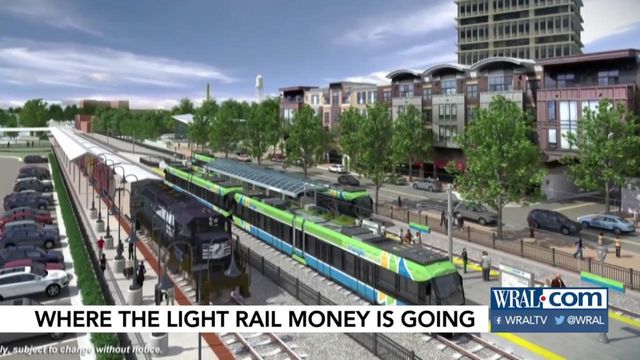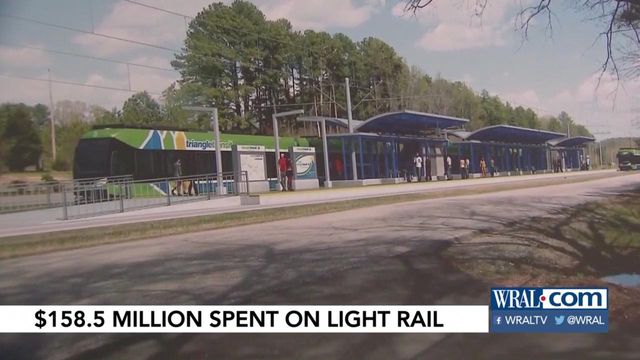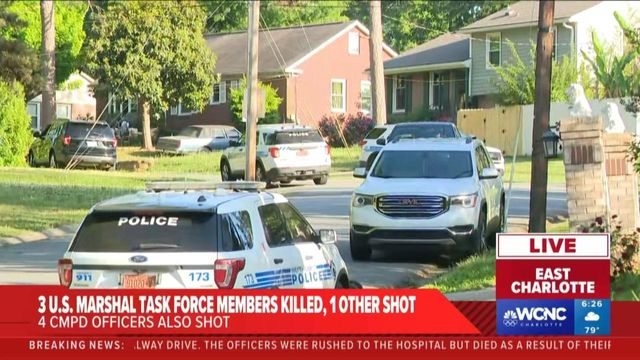No man's land: Site of failed Durham-Orange Light Rail project stands empty
On a recent afternoon in June, Curtis Booker stood on the ridge of his Durham County property clutching a vision of a future that would never arrive.
The color printout he held in his hands depicted the view looking north, from the exact elevation where he stood. But instead of the expanse of tall, kudzu-choked hardwoods just past his gravel driveway that spread for acres down the hill, the artist's rendering showed a brick and glass structure peeking out from behind newly planted growth.
The land had been in his family for more than a century, once part of a 1,000-acre tract cleaved repeatedly by inheritance, auctions and the eventual construction of Interstate 40. But in March 2018, Booker's land was split again by the regional transit authority GoTriangle, which used eminent domain to acquire more than 20 acres from him and seven neighbors.
It was just one part of the Durham-Orange Light Rail project, meant to house a rail operations and maintenance facility along the line's nearly 18-mile route.
"I understand it was taken for proper purposes. In other words: it was a legal use of eminent domain," Booker said. "Then everything went to hell in a hand basket."
Transit and county leaders voted to end the quest for the light rail project this spring. But GoTriangle has spent $3.8 million to take possession of these properties, wedged between I-40 and Farrington Road in the southwest corner of Durham County. The land may end up costing the authority millions more as several ongoing legal disputes rage on.
The cost of the land acquisition one small slice of the nearly $160 million the transit authority expects to spend by the time the project is officially wound down in 2020.
The proposed rail site is mostly empty of people now. And aside from one house demolished due to structural concerns, the land has seen little activity to date.
What happens there next isn't clear – but it's unlikely to involve transit.
Attorneys for the city of Durham last week hammered out a deal with homeowners across the street from the site, who filed a legal challenge over its rezoning earlier this year. They'll drop the lawsuit, the agreement says, if the city rezones the land back to residential. With no light rail facility to build, GoTriangle didn't object.
The new zoning will permit four times the density than before, raising the potential value for any developer looking to build around 200 homes on the newly combined 23-acre tract. And that's raising questions both for former property owners and those who remain.
"I'm still up the hill from all this. So what am I going to be looking at, ultimately?" Booker said. "They have no idea."
{
"name": "social",
"attrs": [],
"children": null
}Source: Durham property records, GoTriangle
Booker never opposed the light rail project or the railyard. And he's quick to point out that he stood to benefit, both from the sale of his Farrington property and another piece near a proposed station further down the line.
Some of his neighbors didn't share that view.
Marcia Rea bought her home on Farrington Road from Booker's family in the 1980s. It was bucolic then, she said. She raised chickens and goats. And when the leaves in the trees were at their fullest in the summer, you could barely hear the rush of I-40 less than 700 feet away from the house.
"I loved the property. I liked the peace and the quiet," Rea said. "It was a comfortable place for us."
One of her daughters eventually bought the property, but Rea still lived there when talk of the rail facility started.
"The stress GoTriangle put our particular family through was awful, to say the least," she said. "I can't say anything good about the experience."
The notices of condemnation came in January 2018, shortly after Rea moved in with her daughter in another part of Durham. For the one-acre property, GoTriangle paid the family $242,000.
"They disrupted a lot of people," Rea said. "And a lot of us were not very happy."
Renters who signed a lease with her family remain on the property, although they're now paying rent to GoTriangle. Their lease runs out in August.
That's not uncommon, said Isaac Thorp, a Raleigh attorney whose firm specializes in eminent domain cases.
"That is sometimes a bitter pill for landowners to swallow when they were forced to sell their property and the condemnor doesn't need it immediately," Thorp said.
{
"name": "social",
"attrs": [],
"children": null
}Legitimate eminent domain cases, Thorp said, give homeowners little recourse outside of negotiating for better prices after public agencies take the land. He represents one of the families with several tracts condemned by GoTriangle for the railyard.
Court records show their case just wrapped up in May – more than a month after Orange and Durham county officials unanimously voted to scuttle the light rail project.
Despite the rail line's cancelation, several of the eminent domain cases over the railyard facility are still winding their way through the Durham courthouse.
A GoTriangle memo estimated those cases could cost an additional $2.2 million in legal expenses and additional settlement money in the 2020 fiscal year.
"These additional amounts of landowner compensation and litigation expenses are not known at this time and cannot be predicted with certainty," the memo said.
Booker is still fighting in court with the transit authority over appraisal values, access to the driveway of his Patterson's Mill country store and a sewer line cut off by the property acquisition.
At this point, he said, it's not the costs that are the biggest unknown.
"Our concern is ultimately what are you going to do right beside me?" Booker said "I don't think the other property owners have that question for obvious reasons: They're not here anymore."
{
"name": "social",
"attrs": [],
"children": null
}
GoTriangle spokesperson Mike Charbonneau said the future of the property won't be up to the transit authority, but to the elected commissioners of the counties it serves.
"That’s something that will have to be determined after Durham and Orange counties update their transit plans and determine what to do with their transit corridor," Charbonneau said.
GoTriangle still owns the land. But beyond the fact that the site won't house a railyard, Durham County Board of Commissioners Chair Wendy Jacobs said she has "no idea" what will happen to it.
"We're just at a very big-picture level right now," Jacobs said. "It's really too early to tell what the future looks like, what comes next."
A few clues did emerge last week, however, in a related lawsuit over rezoning of the property. Nearby residents of a retirement community challenged the city's rezoning of the site to light industrial back in January, citing concerns over noise, traffic and pollution.
The industrial zoning designation included a number of restrictions, only allowing a rail operations and maintenance facility on the site. That would have limited any potential buyer's ability to put the land to any other use.
But in a court order June 12, attorneys for the city of Durham agreed officials would move to rezone the site back to residential to settle the suit.
Durham Mayor Steve Schewel said that was part of the original intent when the city council approved the zoning plan for the railyard back in December 2018.
"There was a clear understanding that if the land was not to be used for transit or a rail operations and maintenance facility that the planning department would come back to us to seek a rezoning so it would no longer have an industrial zoning on it," Schewel said.
The new zoning would allow up to eight units per acre – or up to nine under special circumstances. Buyers could increase that maximum allowed density to 18 units per acre if they add a development plan, according to Durham planning rules.
Before GoTriangle's acquisition, zoning only allowed two units per acre.
Such a change would make the land an attractive prospect for an area that has seen considerable growth in recent years. Down the street, an 11-acre parcel sold in 2017 to Farrington Apartments LP for about $460,000 an acre – nearly three times what GoTriangle paid per acre for the railyard land. Alta Blu, the new 300-unit apartment complex that sits on the land at 5840 Farrington Road now, offers luxury apartments for between $1,200 and $2,000 a month.
"Given the location of the property and all the property they have amassed, somebody is going to make a lot of money if they subdivide or build on it," Rea said. "More or less, the people that had been owners got shafted on that angle too."
Legally, Thorp said, it's likely GoTriangle can sell the property to private buyers because the authority took the land for a legitimate public purpose – even if that public purpose no longer exists.
"I think that although some people are critical (of GoTriangle) for not nailing these details down before they began taking people's property, they condemned the property in good faith," Thorp said. "Now that the properties have been abandoned, I'm not aware of any restrictions on what they can do."
That doesn't sit well with Rea, or with Booker, who said former property owners still have interests in their former land whether they're here or not.
"If GoTriangle tries to sell it – and sells it for significantly more than they paid for it – that money should be theirs," Booker said of his former neighbors.
In court filings, Durham attorneys estimated rezoning for the railyard land will take at least six months to work through the city planning process and earn council approval. In the meantime, several of the pending eminent domain cases will continue in Durham County courts through at least the fall.
But there's no sale eminent or even on the horizon, Charbonneau said.
For the time being, the future of the site remains in limbo. That's new territory for Booker, who despite dealing with eminent domain four separate times in the past isn't sure what's coming next.
"I don't think anybody did this," Booker said. "But I'm just left with so many unanswered questions that ultimately I have to find answers to. Because otherwise, it's way too crippling."
{
"name": "social",
"attrs": [],
"children": null
}










